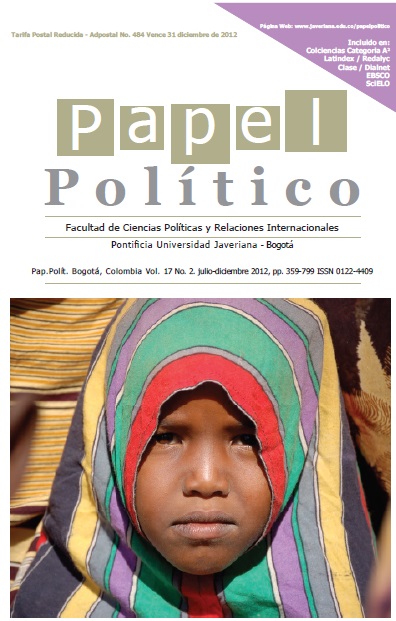Abstract
Criticizing the conventional political theory, this article demonstrates that the rise of multiparty electoral competition, rather than improving the quality of democracy, ended up worse because increase the risk of emergence of candidates linked with criminal agents of different type (drug traffickers, guerrillas, paramilitaries and parapoliticians). This shows how the low institutionalization of the party system at the regional level makes easier and less costly in political and judicial terms, the relationship between politicians and bandits. Finally, it reviseda couple of theories suggesting the electoral success of criminalized candidates as a productof patronage, income, poverty and party affiliation. The results of a non-parametric statistical model indicated the predictive limits of such theories. However, the authors find out that “fiscal laziness” is significantly associated with the likelihood of electoral success of candidates who allied themselves with illegal agents.
This journal is registered under a Creative Commons Attribution 4.0 International Public License. Thus, this work may be reproduced, distributed, and publicly shared in digital format, as long as the names of the authors and Pontificia Universidad Javeriana are acknowledged. Others are allowed to quote, adapt, transform, auto-archive, republish, and create based on this material, for any purpose (even commercial ones), provided the authorship is duly acknowledged, a link to the original work is provided, and it is specified if changes have been made. Pontificia Universidad Javeriana does not hold the rights of published works and the authors are solely responsible for the contents of their works; they keep the moral, intellectual, privacy, and publicity rights.
Approving the intervention of the work (review, copy-editing, translation, layout) and the following outreach, are granted through an use license and not through an assignment of rights. This means the journal and Pontificia Universidad Javeriana cannot be held responsible for any ethical malpractice by the authors. As a consequence of the protection granted by the use license, the journal is not required to publish recantations or modify information already published, unless the errata stems from the editorial management process. Publishing contents in this journal does not generate royalties for contributors.


